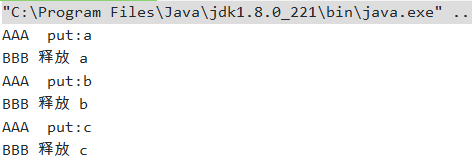阻塞队列(BlockingQueue)
阻塞队列:
Queue接口与List、Set同一级别,都是继承了Collection接口。LinkedList实现了Queue接口。
BlockingQueue接口的实现类

BlockingQUeue的核心方法


一、ArrayBlockingQueue
1、抛出异常:
1 2 3 4 5 6 7 8 9 10 11 12 | BlockingQueue<String> queue = new ArrayBlockingQueue<>(3);// 1、抛出异常:add/removeSystem.out.println(queue.add("a"));System.out.println(queue.add("b"));System.out.println(queue.add("c"));// 超出队列长度报错:Queue full// System.out.println(queue.add("x"));queue.remove();queue.remove();queue.remove();// 队列中没有元素报错:NoSuchElementException//queue.remove(); |
2、特殊值
1 2 3 4 5 6 7 8 9 10 11 12 | BlockingQueue<String> queue = new ArrayBlockingQueue<>(3);// 2、特殊值:offer/pollSystem.out.println(queue.offer("a"));System.out.println(queue.offer("b"));System.out.println(queue.offer("c"));// 插入不进去元素会返回falseSystem.out.println(queue.offer("x"));System.out.println(queue.poll());System.out.println(queue.poll());System.out.println(queue.poll());// 取不到数据会返回nullSystem.out.println(queue.poll()); |
3、阻塞
1 2 3 4 5 6 7 8 9 10 11 12 | BlockingQueue<String> queue = new ArrayBlockingQueue<>(3);// 3、阻塞queue.put("a");queue.put("b");queue.put("c");// 队列插入不了数据,会一直卡住// queue.put("x");System.out.println(queue.take());System.out.println(queue.take());System.out.println(queue.take());// 检索并删除此队列的头,如有必要,请等待直到元素可用System.out.println(queue.take()); |
4、超时
1 2 3 4 5 6 7 8 9 10 11 12 | BlockingQueue<String> queue = new ArrayBlockingQueue<>(3);// 3、超时System.out.println(queue.offer("a", 2L, TimeUnit.SECONDS));System.out.println(queue.offer("b", 2L, TimeUnit.SECONDS));System.out.println(queue.offer("c", 2L, TimeUnit.SECONDS));// 队列已满会等待指定的时间,返回falseSystem.out.println(queue.offer("x", 2L, TimeUnit.SECONDS));System.out.println(queue.poll(2L, TimeUnit.SECONDS));System.out.println(queue.poll(2L, TimeUnit.SECONDS));System.out.println(queue.poll(2L, TimeUnit.SECONDS));// 队列已满会等待指定的时间,返回nullSystem.out.println(queue.poll(2L, TimeUnit.SECONDS)); |
二、SynchronizeousQueue:生产一个消费一个
1 2 3 4 5 6 7 8 9 10 11 12 13 14 15 16 17 18 19 20 21 22 23 24 25 26 27 28 29 30 31 32 33 34 35 36 37 38 39 40 41 42 43 | import java.util.concurrent.ArrayBlockingQueue;import java.util.concurrent.BlockingQueue;import java.util.concurrent.SynchronousQueue;import java.util.concurrent.TimeUnit;import java.util.concurrent.locks.Lock;import java.util.concurrent.locks.ReentrantLock;/** * @author zhangzhixi * @date 2021-4-20 22:08 */public class Demo_05_阻塞队列 { public static void main(String[] args) throws InterruptedException { SynchronousQueue<String> queue = new SynchronousQueue<>(); // 一个线程用来生产 new Thread(() -> { try { System.out.println(Thread.currentThread().getName() + "\t put:" + "a"); queue.put("a"); System.out.println(Thread.currentThread().getName() + "\t put:" + "b"); queue.put("b"); System.out.println(Thread.currentThread().getName() + "\t put:" + "c"); queue.put("c"); } catch (InterruptedException e) { e.printStackTrace(); } }, "AAA").start(); // 一个线程用来消费 new Thread(() -> { try { TimeUnit.SECONDS.sleep(3); System.out.println(Thread.currentThread().getName() +"\t释放 " +queue.take()); TimeUnit.SECONDS.sleep(3); System.out.println(Thread.currentThread().getName() +"\t释放 " +queue.take()); TimeUnit.SECONDS.sleep(3); System.out.println(Thread.currentThread().getName() +"\t释放 " +queue.take()); } catch (InterruptedException e) { e.printStackTrace(); } }, "BBB").start(); }} |

三、PriorityBlockingQueue:阻塞优先队列
PriorityBlockingQueue是一个无界队列,它没有限制,在内存允许的情况下可以无限添加元素;它又是具有优先级的队列,是通过构造函数传入的对象来判断,传入的对象必须实现comparable接口。
1 2 3 4 5 6 7 8 9 10 11 12 13 14 15 16 17 18 19 20 21 22 23 24 25 26 27 28 29 30 31 32 33 34 35 36 37 38 39 40 41 42 43 44 45 | public static void main(String[] args) { // 1、新建一个优先阻塞队列 BlockingQueue<Person> blockingQueue = new PriorityBlockingQueue<>(); Person per = null; // 2、添加数据 blockingQueue.add(new Person(6, "张三", 20)); blockingQueue.add(new Person(5, "李四", 20)); blockingQueue.add(new Person(1, "王五", 28)); // 3、取出数据 blockingQueue.forEach(System.out::println);}class Person implements Comparable<Person> { private Integer id; private String name; private Integer age; public Person() { } public Person(Integer id, String name, Integer age) { this.id = id; this.name = name; this.age = age; } @Override public int compareTo(Person o) { // 比较规则,先按照age进行从小到大排序,如果年龄一样再按照id进行从小到大排序 if (this.age.compareTo(o.age) == 0) { return this.id.compareTo(o.id); } return this.age.compareTo(o.age); } @Override public String toString() { return "Person{" + "id=" + id + ", name='" + name + '\'' + ", age=" + age + '}'; }} |
结果:
1 2 3 | Person{id=5, name='李四', age=20}Person{id=6, name='张三', age=20}Person{id=1, name='王五', age=28} |
















【推荐】国内首个AI IDE,深度理解中文开发场景,立即下载体验Trae
【推荐】编程新体验,更懂你的AI,立即体验豆包MarsCode编程助手
【推荐】抖音旗下AI助手豆包,你的智能百科全书,全免费不限次数
【推荐】轻量又高性能的 SSH 工具 IShell:AI 加持,快人一步
· go语言实现终端里的倒计时
· 如何编写易于单元测试的代码
· 10年+ .NET Coder 心语,封装的思维:从隐藏、稳定开始理解其本质意义
· .NET Core 中如何实现缓存的预热?
· 从 HTTP 原因短语缺失研究 HTTP/2 和 HTTP/3 的设计差异
· 分享一个免费、快速、无限量使用的满血 DeepSeek R1 模型,支持深度思考和联网搜索!
· 基于 Docker 搭建 FRP 内网穿透开源项目(很简单哒)
· ollama系列01:轻松3步本地部署deepseek,普通电脑可用
· 按钮权限的设计及实现
· 25岁的心里话